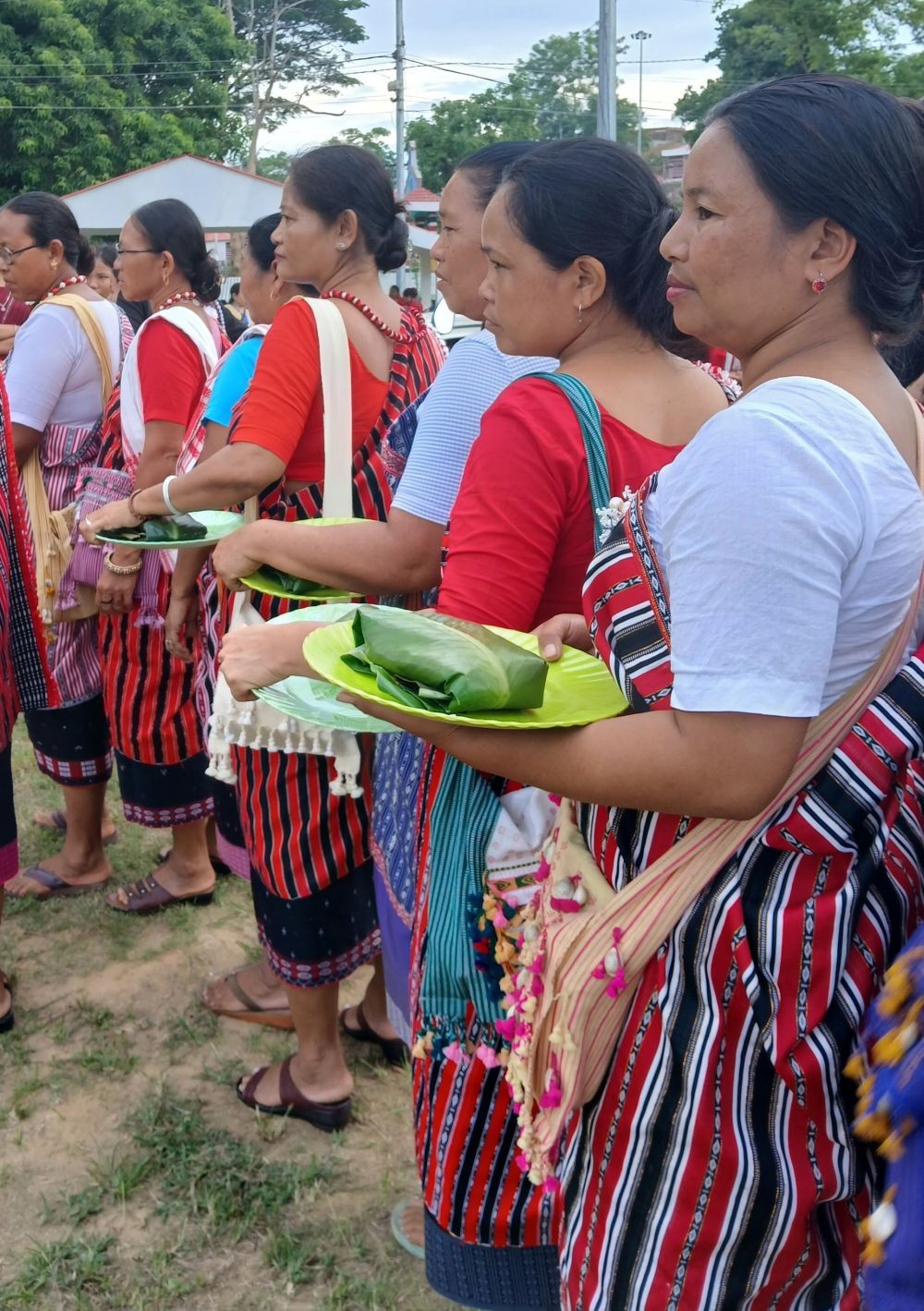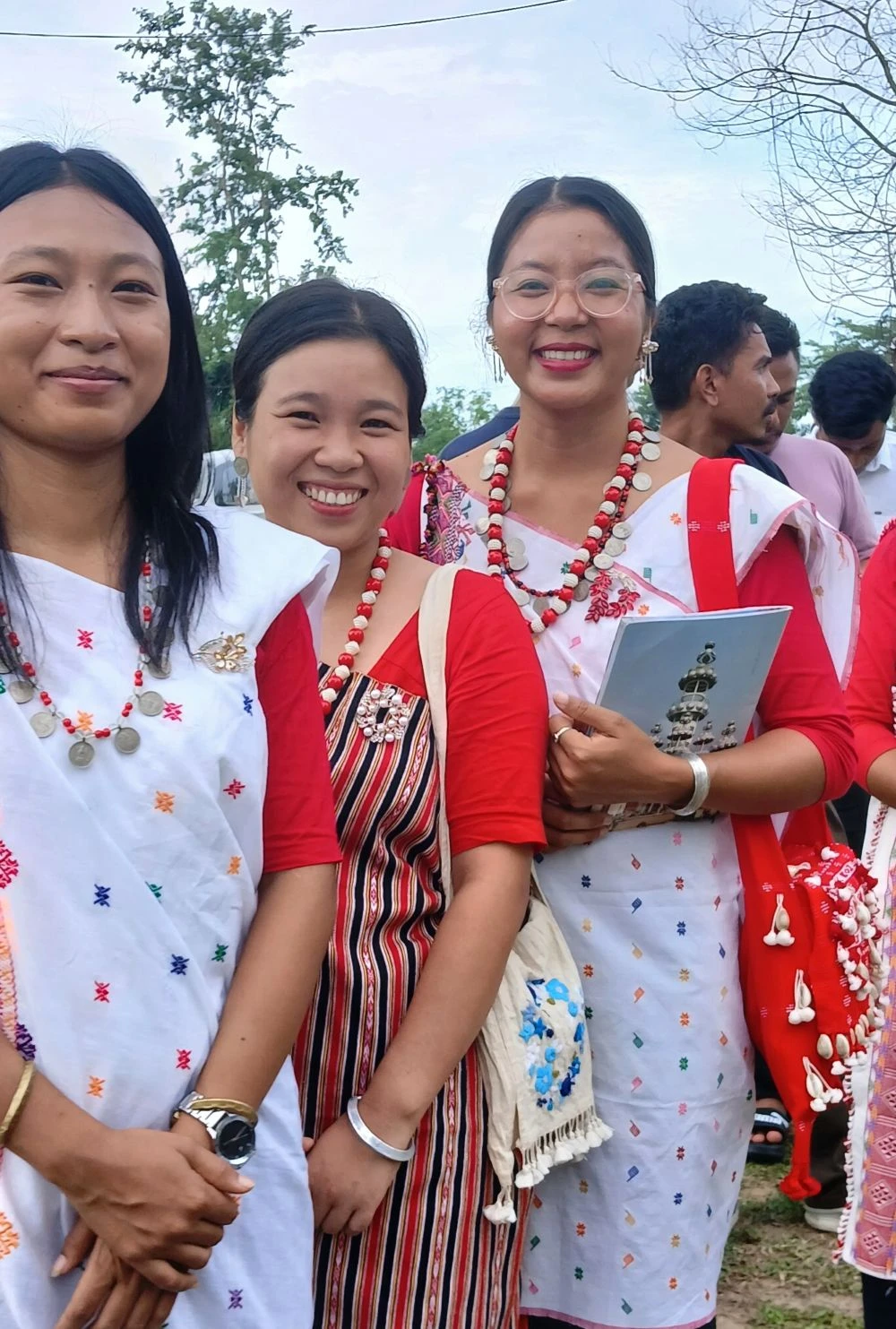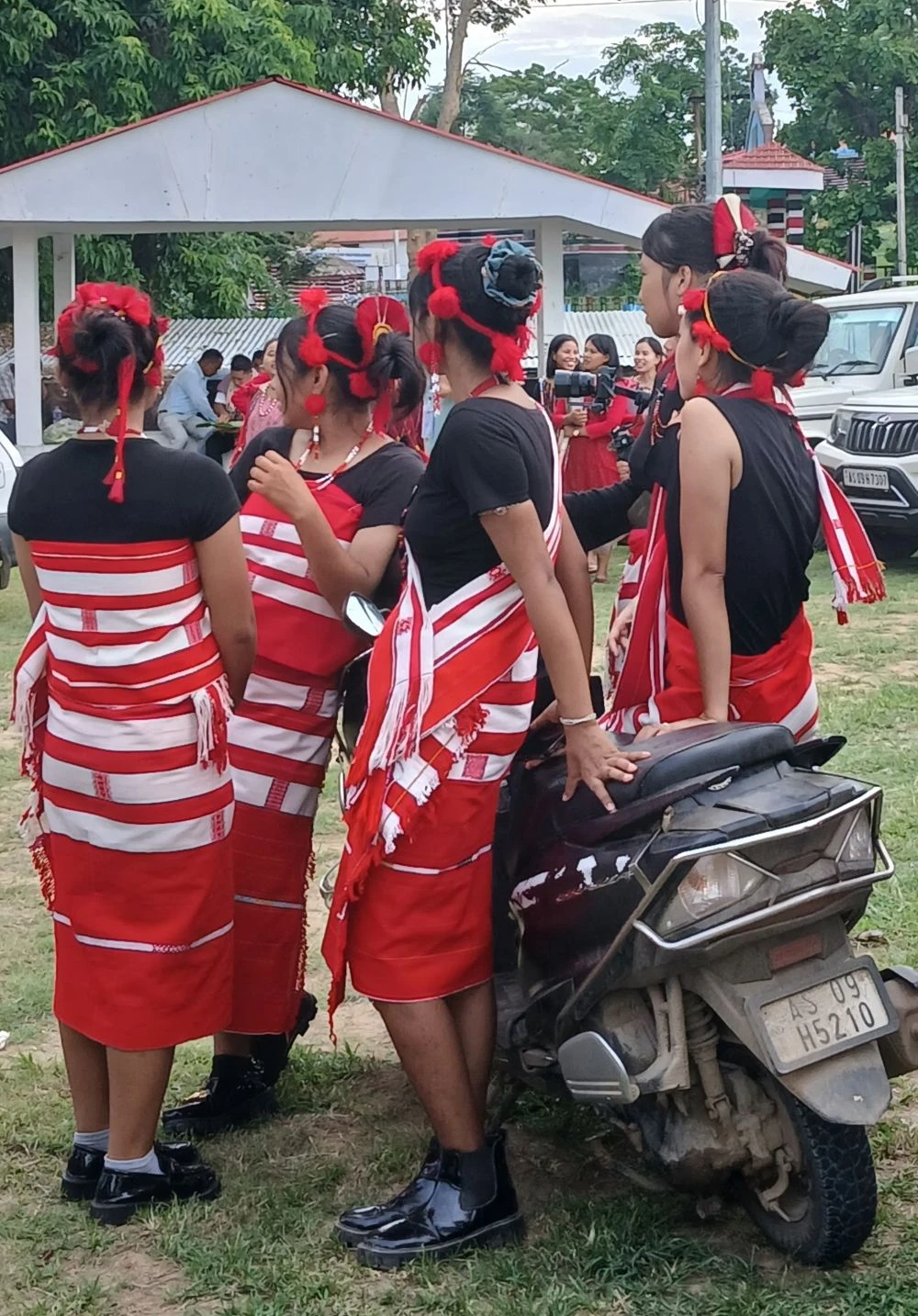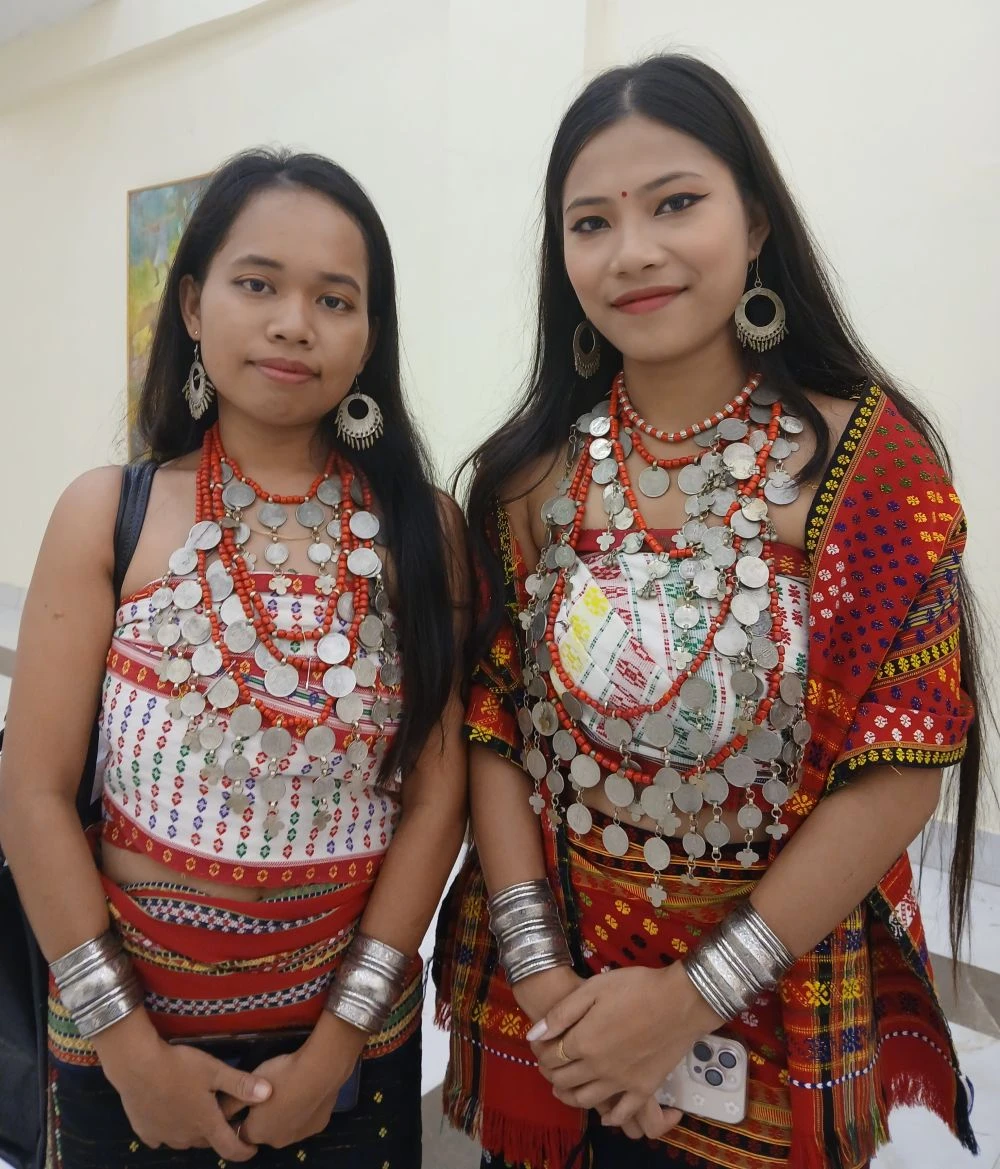A group of Karbi women holds plates of rice wrapped in leaves during the International Day of the World’s Indigenous Peoples in Diphu, Karbi Anglong, on August 9. In many indigenous communities, rice and other foods are often steamed or packed in leaves, which adds a distinct flavor to the food items. (Morung Photo)

Akangjungla
Diphu | August 10
“A troubling contradiction” was how Gam A Shimray, Secretary General of the Asia Indigenous Peoples Pact (AIPP), characterised what he contended was the Government of India (GoI)’s denial of indigenous status to tribal peoples and the growing appropriation of constitutional safeguards by dominant ethnonationalist groups.
Speaking at an event marking the International Day of the World’s Indigenous Peoples in Diphu, Karbi Anglong, on August 9, the Naga rights activist and peace advocate said such policies “undermine historical justice, constitutional integrity, and the principles of peoplehood, equality, and non-discrimination in international law.”
Reflecting on the topic, “In Defence of India’s Indigenous Peoples: Confronting Denial and Appropriation,” Shimray rejected the GoI’s reported assertion that “all Indians are indigenous,” that Scheduled Tribes are merely administrative categories, and that nativeness can be equated with indigeneity.
This is not only legally “unfounded but also historically inaccurate and ethically indefensible,” he asserted, emphasising that India’s tribal communities, constitutionally recognised as Scheduled Tribes (STs), are not simply socioeconomically disadvantaged.

The Indigenous Peoples are culturally distinct societies with unique languages, belief systems, ecological knowledge, customary governance, and ancestral territories, he pointed out, adding that they maintained self-governance and collective land ownership, often outside the dominant caste-state frameworks.
This distinctiveness, the AIPP Secretary General held, has been constitutionally affirmed through the Fifth and Sixth Schedules, and Articles 244, 371A, 371G, among others, safeguarding tribal customary practices, indigenous institutions, and land rights.
These provisions are not tools for administering poverty but for protecting unique identities and ways of life, he said, cautioning that treating indigenous communities as mere administrative constructs “erases” the enduring legacy of colonialism they continue to resist.
'Indigeneity is not a symbolic label'
Indigeneity, under ILO Convention 169 and the United Nations Declaration on the Rights of Indigenous Peoples (UNDRIP), is not defined by mere antiquity or nativeness, Shimray argued, but by interrelated criteria such as self-identification, historical continuity, non-dominance, and distinct cultural and institutional systems.
India’s tribal peoples meet these criteria unequivocally, he argued, but noted that the communities have had “faced both external and internal colonisation, remain politically and economically marginalised, and retain deep cultural and spiritual ties to ancestral lands.”
“Indigeneity is not a symbolic label; it is a lived reality shaped by colonialism, structural inequality and dispossession. It is not a status one can conveniently claim, it is a condition one must survive,” he reiterated.
Shimray also expressed concern over a growing trend of “reverse mainstreaming,” where socially and politically dominant groups seek ST status to claim rights and benefits meant for historically oppressed communities.
Such groups often wield significant influence over state institutions and economic resources, and may have histories of subjugating tribal populations or acting as instruments of colonial domination, he noted.

These claims, he reiterated, ignore the foundational logic of the ST classification to protect communities that have historically remained outside dominant state structures and caste hierarchies.
According to the activist, opposing such claims is not parochialism, but a defence of constitutional clarity, international law and historical truth.
He stressed that India's STs qualify as Indigenous Peoples under both international law and constitutional principles, citing their “experiences of colonialism, dispossession, and cultural resilience place us firmly within the global indigenous struggle.” In this connection, Shimray urged the GoI to “aligns its domestic policies with its constitutional commitments and its international obligations.”
Breaking free from colonial frameworks
Meanwhile, underscoring their potential, the AIPP functionary also pressed the Indigenous Peoples to develop their own vision beyond colonial frameworks and move from resistance towards the deeper work of reconstruction.
Indigenous Peoples have inherited a rich legacy of collective life, moral leadership, and spiritual connection to the land but they have often lacked a clear vision for their political future and continue to operate within colonial-era frameworks that do not reflect their own truths, values, or ways of being, he maintained.
Consequently, Shimray argued, they continue to “operate within systems built not for freedom, but for control,” which fragment communities, undermine the moral compass, and stifle genuine self-governance, a condition he said is evident even in the “autonomy provisions” under the Sixth Schedule and Articles 371A, 371C, and 371G.
Accordingly, he identified three critical gaps in the Indigenous Peoples’ political thought and movements - lack of shared institutional vision rooted in cultural and historical foundations; lack of creative and progressive imagination; and a moral failure to honour who they are.

For Shimray, it is “morally indefensible to replicate the very systems that subjugated us” and the post-colonial states like India had adopted colonial systems of “extract, divide and dominate.”
“They are not neutral; they are the expression of a worldview that denies the agency and dignity of Indigenous Peoples,” he claimed.
As a meaningful way forward, he called for rejecting such logic and building institutions grounded in Indigenous Peoples’ own sense of justice, responsibility, and belonging.
Such governance must spring from “an authentic expression of our memory, our suffering, and our enduring vision for a free and dignified life” and “not replicate the master’s tools,” he added.
Shimray noted a global resurgence of Indigenous communities reclaiming narratives, rebuilding institutions, and renewing future visions.
However, he stressed that Indigenous Peoples are not alone in reimagining alternatives and deepening democracy, asserting that if others can draw strength from their roots to build anew, so can they.
“The time to begin is now,” he added.






